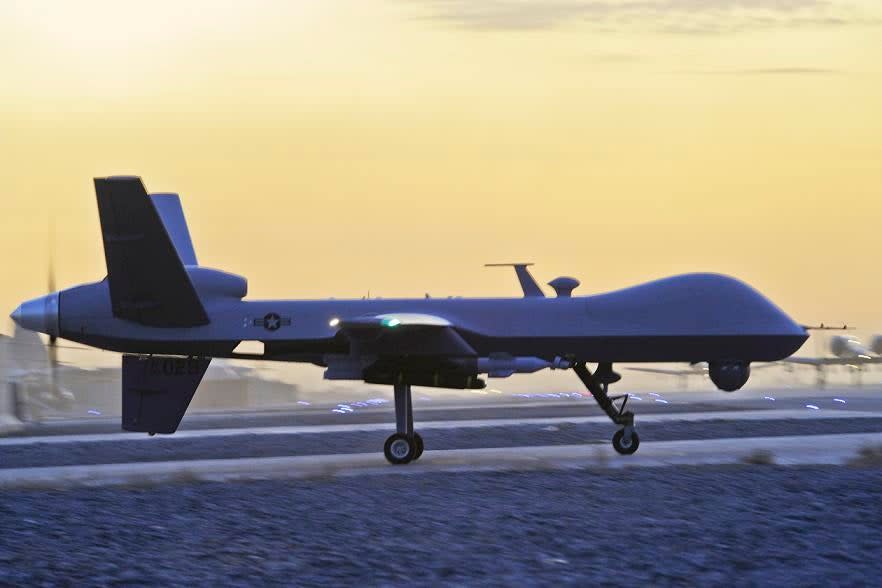Biden secretly limits drone strikes, amid congressional scrutiny over war powers

A US MQ-9 Reaper drone taxis at Kandahar Airfield, Afghanistan, in December 2009.
(U.S. Air Force photo/Tech. Sgt. Efren Lopez)The Biden administration secretly put temporary limits on the use of drone strikes and commando raids outside of traditional battlefield settings like Afghanistan or Syria, part of a larger national security review of whether to alter use of force rules from the Trump administration.
The changes, which the administration put in place on Mr Biden’s first day in office, were first reported on Wednesday by the New York Times, and come as the Biden administration recalibrates the sprawling US footprint across the Middle East, and Congress pushes to rein in the president’s war-fighting powers and scrutinises a recent strike in Syria.
Under the temporary freeze, the military and CIA need direct White House permission to attack terrorism suspects outside of regular US battlefields, and will apply in places like Yemen and Somalia. Under the Trump administration, officials within these branches were left to decide for themselves when to carry out such strikes.
Greater data transparency on killings and civilian deaths, as well new standards on avoiding civilian casualties, are among the changes being considered as part of the broader review.
“This review includes an examination of previous approaches in the context of evolving counterterrorism threats in order to refine our approach going forward,”Emily Horne, spokeswoman for national security council, told the Times. “In addition, the review will seek to ensure appropriate transparency measures.”
The US has been using drones and special forces raids under four different administrations in the the two decades following the 9/11 attacks, going so far as to kill US citizen Anwar al-Awlaki, a radical cleric, in Yemen in 2011.
The Obama administration, where Mr Biden was vice-president, greatly expanded the use of drone strikes, before later imposing various checks on the practice, such as a 2013 requirement targets are a “continuing and imminent threat” to Americans, and a 2016 policy about disclosing fatality and civilian casualty numbers to the public, both policies which the Trump administration scrapped.
The Biden administration’s war policy actions have been met with scepticism so far from rights groups and the president’s liberal allies.
“President Biden promised to end forever wars, but tinkering with the bureaucracy of this extrajudicial killing program will only entrench American abuses,” Hina Shamsi, director of the American Civil Liberties Union’s national security project, said in a statement. “In the name of counterterrorism, US presidents have for two decades authorised unlawful, secretive, and unaccountable killing abroad.”
The president has made a number of major changes so far, particularly to US policy towards the war in Yemen between a US-backed coalition of Gulf states and the Iranian-backed Houthi militia.
Mr Biden paused arms sales to Saudi Arabia, named a special envoy for the six-year conflict, and lifted a Trump administration designation of the Houthis as terrorists, in an effort to bring an end to the war, which has created one of the world’s worst humanitarian crises in its wake.
But the president hasn’t escaped scrutiny, especially following US strikes in late February against Iranian-backed militia targets in Syria, a response to previous militia attacks against US forces in Iraq that have killed and injured service members and contractors.
The strikes, made without consultation with Congress, provoked the ire of some lawmakers, as did a decision to decline to penalise Saudi Crown Prince Mohammed bin Salman for the 2018 murder of US-based journalist Jamal Khashoggi.
“Last week’s airstrikes in Syria show that the Executive Branch, regardless of party, will continue to stretch its war powers,” Virginia senator Tim Kaine, a Democrat, said in a statement this week.
He is part of a bipartisan group seeking to repeal the legal authorisations underpinning the US War on Terror, which has stretched on for 20 years, long since its original adversaries have morphed and dispersed. The proposed bill would re-emphasise Congress’ constitutionally prescribed role in declaring war.
Read More
Biden called off second Syria strike after last minute warning of woman and children at target site
US orders airstrike in Syria against Iran-backed militia, reports say

